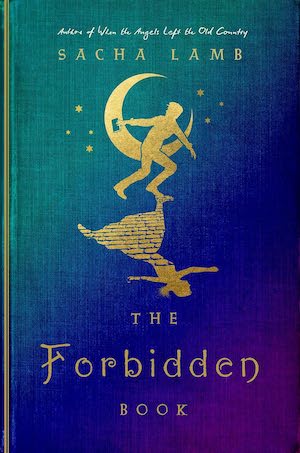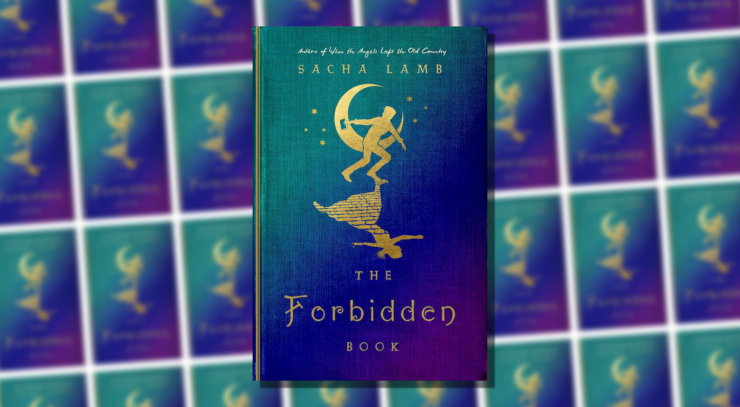She might have found the face pretty, had she not been trying to see it as her own.
From the first page of Sacha Lamb’s The Forbidden Book, Sorel Kalmans’ misalignment with her sense of self and the expectations put upon her thrums with fervent tension. It’s a brilliant opening image—a familiar one, the reluctant or runaway bride, but Lamb sets the tone for a fresh take steeped in Jewish folklore, queer awakening, and a reckoning of body and spirit. If you picked up this book for the description of “genderqueer lesbian with a knife,” know that that pithy label, while accurate, boundaries the text and Sorel’s shifting identity in a way the story itself doesn’t try to. That queer sense of depersonalization—an awareness of the image of the self that is not inherently a negative image, it just doesn’t feel like it belongs to you, or you to it. The very concept of a dybbuk possession complicates questions of identity in intentional, thought-provoking ways. Bodily agency, body versus mind, a dormant spirit of a different gender waking within you—to be a shared vessel for multiple souls and what that does to an individual’s psyche. While we can’t conflate these experiences with human sexuality in the real world, Sorel and Isser’s preternatural plot offers a fresh way into the messy tangle of gender, its freedoms, and its restrictions.
The Forbidden Book begins with a literal leap of faith, incited by a sense of depersonalization, nonbelonging, and the shadow of dysphoria. Seventeen-year-old Sorel finds herself promised to the rebbe’s heir—not in itself a horrific fate, but for its calculated orchestration by her powerful merchant father, and the simple fact that when Sorel looks at herself as a bride, she can’t recognize who she sees. There’s no future there that makes sense to her. So when a voice calls within her to jump and flee, she listens. Out in the small, stratified world textured by 19th century Russia or Eastern Europe, Sorel has nowhere to hide from her fate. She takes up the name of a boy, Isser Jacobs. She thought she invented a new identity, but it turns out there is a real Isser Jacobs, and moving through the world as him will bring Sorel on a path far more fraught than she knew possible.
Without giving too much away, the majority of the novel features Sorrel somewhat possessed by the real Isser, who now exists as a dybbuk—a displaced spirit of Jewish folklore. Sorrel knows what she’s running from, but she must figure out what she’s running toward, all the while navigating the dangers that plagued the real Isser Jacobs and the life she’s stumbled into.
This is my first time reading Sacha Lamb, and one of my most consistent thoughts was that this book asks a lot from its readers, especially in terms of clarifying world building and stakes. About halfway through I started to suspect that perhaps this wouldn’t feel like the case if I’d read Lamb’s widely acclaimed debut When the Angels Left the Old Country first, as I’d have had some familiarity with their writing and a baseline of the folklore they draw from. I skimmed a bit of the debut and at a glance it seems to confirm my suspicion, and I plan on reading it in full in the future. I imagine fans of When the Angels will find comfort and excitement in the rich immersion of The Forbidden Book. In terms of worldbuilding, stakes, and accessibility, it seems that might be the best place to start. I confess to getting a bit lost and bogged down by the details in Lamb’s sophomore effort.
Buy the Book


The Forbidden Book
While I’m half-Jewish, my Jewish parent was extremely secular—entirely Jewish but with no bindings to orthodoxy or anything outside of the traditions he personally enjoyed. So, much of the distinctions and connections between Jewish folklore and magic here are rooted in nuance I’m not personally fluent in, and I can’t speak to its efficacy or tone for those who better understand the source material. I found it richly textured but not entirely clear and therefore less gripping than I wanted it to be—a reader with greater familiarity will likely have a different experience. I felt outside of the extremely intricate, encompassing worldbuilding, which made me feel outside of the characters. The pace felt a bit uneven, the stakes unclear. I’m not entirely sure who the angels are, what threats or boons they portend. I mention my own identity because I get the sense that in many ways I am the target audience, a fantasy-loving secular Jewish diaspora kid who loves books and magic and has a base understanding of Jewish folklore, and it still felt like a barrier to entry. Would it read more easily to someone who approached all the speculative elements of the book as pure magic instead of trying to anchor them with cultural touchstones? What would get lost in that reading?
The Forbidden Book has a narrow focus: It’s really centered on Sorrel, Isser, and two particular characters who influence their journey, amidst a series of angels. For a narrow focus, though, and a story so invested in Sorrel’s exploration of identity, I’m still not sure who she is. I understand much of who she is not, but I’m not sure what exactly she’s running from, nor do I understand the other central characters as full characters, as opposed to plot points or symbols in Sorrel’s own life.
There’s much here on the tensions between freedom and responsibility, a duty to self versus a duty to community, and the power of the printed word. There are several fascinating beats centered on secretly navigating a magically shifting gender presentation in a rigidly gendered culture, which composed some of my favorite throughlines in the book. I think there are plenty of readers this will sing to. Even when I found myself somewhat lost in the text, the richness of the world and the thoroughly imagined writing still swept me pleasurably away.
The Forbidden Book is published by Levine Querido.










